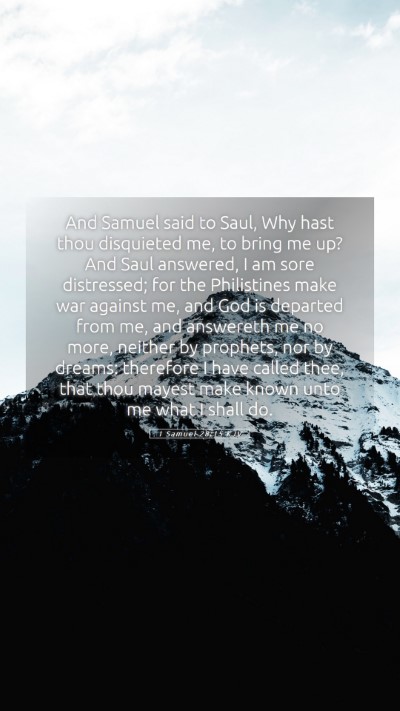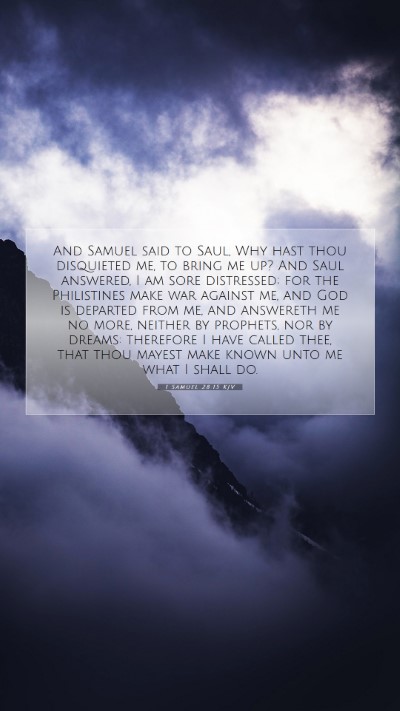Understanding 1 Samuel 28:15 - A Comprehensive Bible Verse Commentary
Bible Verse: 1 Samuel 28:15
1 Samuel 28:15 states, "And Saul said to Samuel, 'Why have you disquieted me to bring me up?' And Samuel said, 'Because you have disobeyed the voice of the Lord, and have not executed His fierce wrath upon Amalek; therefore the Lord has done this thing to you this day.'" This verse captures a pivotal moment in the life of King Saul, highlighting themes of disobedience, divine judgment, and the consequences of straying from God’s commandments.
Insights from Public Domain Commentaries
Matthew Henry's Commentary
Matthew Henry outlines the desperate state of Saul, who sought guidance from the dead prophet Samuel rather than from the living God. In this episode, Saul’s disobedience to God’s decrees, particularly his failure to utterly destroy Amalek, has led him to a situation where he must confront the spiritual consequences of his actions. Henry emphasizes the seriousness of consulting the dead, a practice forbidden by God, which serves as a reflection of Saul's spiritual decline. Henry also notes that this exchange reveals God's judgment against Saul's sin, demonstrating that neglecting divine commands leads to dire outcomes.
Albert Barnes' Commentary
Albert Barnes addresses the context leading up to this moment, pointing out that Saul was overwhelmed with fear from the Philistine armies. His distress drove him to seek the medium at Endor, a sign of his diminishing faith. Barnes comments on the significance of Samuel's appearance; it exemplifies the continuity of divine authority even in death. The message Saul receives from Samuel reaffirms God's judgment on his kingship due to his infringement upon God's orders, particularly regarding the spoiling of Amalek. Barnas concludes that this moment illustrates the desperate situation of a man who has turned to forbidden practices in the absence of God's favor.
Adam Clarke's Commentary
Adam Clarke elaborates on the historical context of Saul’s engagement in necromancy, emphasizing how it showcases his departure from faithfulness to God. Clarke notes that Saul's question indicates his guilt; he acknowledges Samuel’s distress as stemming from his (Saul's) own failures. In addition, Clarke highlights the theological implications, suggesting that the presence of Samuel serves to validate the prophetic authority of God even posthumously. Furthermore, Saul’s acknowledgment of divine wrath underscores the consequences of persistent rebellion against divine directives. Clarke’s insights highlight that the dead cannot change God’s purpose or execute judgment, reinforcing the importance of obedient living.
Spiritual Themes and Applications
This verse encapsulates several key themes relevant to Bible study insights:
- The Danger of Disobedience: Saul’s fate serves as a warning of the consequences faced when one turns away from following God's instructions.
- Seeking Guidance in Wrong Places: Saul's turn to a medium instead of God illustrates the desperation that often accompanies a lack of faith, encouraging the reader to seek God in times of trouble.
- The Continuity of God's Voice: Samuel’s appearance reminds us that God’s voice continues to call us to obedience, even when we stray.
- The Nature of Divine Judgment: The text illustrates that divine judgment is not only an act of punishment but also a direct response to one’s choices and actions.
In-Depth Bible Verse Analysis
Understanding Scripture, especially verses like 1 Samuel 28:15, can be complex, yet it is vital for grasping the overarching narrative of the biblical text. This verse is a call to recognize the weight of one’s decisions before God, emphasizing the need to abide by His commands to avoid tragic consequences.
Cross References
- Deuteronomy 18:10-12: Warning against necromancy and consulting the dead.
- 1 Samuel 15:23: God's rejection of Saul for disobedience.
- Hebrews 9:27: The finality of death and the inability to consult the dead for guidance.
Conclusion
1 Samuel 28:15 serves as a profound lesson in the consequences of disobedience and the importance of seeking God’s guidance through prayer and repentance rather than through forbidden practices. This commentary provides a comprehensive understanding of the verse, encouraging deeper engagement with Scripture and a commitment to abiding by God's word.


